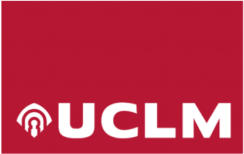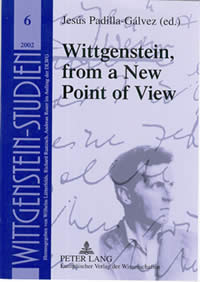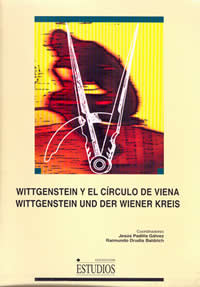
Philosophical or Empirical Anthropology?
Philosophische oder empirische Anthropologie?
¿Antropología filosófica o empírica?
International Wittgenstein Congress
Wednesday, 2 September – Friday, 4 September 2009
University of Castilla-La Mancha
Facultad de Ciencias Jurídicas y Sociales
San Pedro Mártir, s/n.
E-45071 Toledo
( SPAIN )
Invited Speakers
Invited Speakers include:
- Prof. Dr P. M. S. Hacker
Emeritus Research Fellow
University of Oxford
St Johns College
Oxford OX1 3JP
(England)
Telephone: 0044 1865 277300
web: http://info.sjc.ox.ac.uk/scr/hacker/hacker1.html
- Prof. Dr. Robert J. Fogelin
Professor of Philosophy and Sherman Fairchild Professor in the Humanities at Dartmouth College
Department of Philosophy
Dartmouth College
Hanover
NH 03755
(USA)
- Prof. Dr. James Conant
Department of Philosophy
University of Chicago
Stuart Hall, Room 202
1115 E. 58th St .
Chicago, IL 60637
(USA)
Office phone: 773/702-6146
Fax: 773-702-5259
e-mail: jconant@uchicago.edu
web: http://philosophy.uchicago.edu/faculty/conant.html
- Prof. Dr. Manuel García-Carpintero
Departament de Lògica, Història i Filosofia de la Ciència
Universitat de Barcelona
Montalegre, 6-8, 4ª planta, porta 4044
08001 Barcelona
(Spain)
Tel.: 0034 934 037 983
Fax: 0034 934 037 980
e-mail: m.garciacarpintero@ub.edu
web: http://www.ub.edu/grc_logos/people/garciacarpintero/index.htm
- Prof. Dr. Pirmin Stekeler-Weithofer
Lehrstuhl für Theoretische Philosophie
Universität Leipzig
Beethovenstr. 15
D-04107 Leipzig
(GERMANY)
- Ao.Univ.-Prof. Dr. Christian Kanzian
Institut für Christliche Philosophie
Karl-Rahner-Platz 1
A-6020 Innsbruck
(AUSTRIA)
Tel.: +43/512/507-8527
Fax: +43/512/507-2736
e-mail: christian.kanzian@uibk.ac.at
- Prof. Dr. António Marques
New University of Lisbon
Instituto de Filosofia da Linguagem
Faculdade de Ciências Sociais e Humanas/ UNL
Edifício I&D – Salas 4.01, 4.02 & 4.12
Av. de Berna, 26
1069-061 Lisboa
PORTUGAL
Tel.: +351 217908300 Ext. 1527
web: http://www.ifl.pt/main/Pessoas/NunoVenturinha/tabid/101/Default.aspx
e-mail: nventurinha.ifl@fcsh.unl.pt
- Prof. Dr. Alejandro Tomasini Bassols
Instituto de Investigaciones Filosóficas
UNAM
Circuito Maestro Mario de la Cueva s/n.
Ciudad Universitaria, CP. 04510, Coyoacán,
México D.F.
(MEXICO)
e-mail: bassols@servidor.unam.mx
- Professor Dr. Hans-Johann Glock
LehrstuhUniversität Kassel
Institut für Philosophie
Nora-Platiel-Str. 1
D-34109 Kassel
(GERMANY)
Tel.: 0561 804-5328
Telefax: 0561 804-5446
e-mail: stefan.majetschak@uni-kassel.de
web: www.uni-kassel.de/philosophie
- Prof. Dr. Henrike Moll
Department of Developmental and Comparative Psychology
Max Planck Institute for Evolutionary Anthropology
Deutscher Platz 6
04103 Leipzig
(GERMANY)
Tel.: +49 (341) 3550 – 428
Fax: +49 (341) 3550 – 119
e-mail: moll@eva.mpg.de
- Prof. Dr. Olli Lagerspetz
Department of Philosophy
Åbo Akademi University
FIN – 20 500 Åbo
(FINLAND)
Tel.: +358 -2- 215 4597
Fax +358 -2- 215 4845
e-mail: olli.lagerspetz@abo.fi
- Prof. Dr. Nicanor Ursua Lezaun
Universidad del País Vasco
Facultad de Filosofía y Ciencias de la Educación /
Filosofia eta Hezkuntza Zientzien Fakultatea
Área de Filosofía
Avda. de Tolosa, 70
20018 Donostia
Tel: 0034 943-018269
Fax: 0034 943 015470
e-Mail: nicanor.ursua@ehu.es
web: http://www.sc.ehu.es/yfweb/paginas-personales/Ursua.htm
- Prof. Dr. Donatella Di Cesare
Facoltà di Filosofia
Università di Roma «Sapienza»
via Carlo Fea 2
00161 Roma
(ITALIA)
e-mail: Donadice@aol.com
web: http://www.donadice.com
- Prof. Dr. Geert-Lueke Lueken
Institut für Philosophie, Universität Leipzig
Institut für Philosophie
Universität Leipzig
Beethovenstraße 15
04107 Leipzig
(GERMANY)
Tel.: 0049 0341 97 35 826
Fax: 0049 0341 97 35 849
e-mail: lueken@uni-leipzig.de
web: http://www.uni-leipzig.de/~philos/lueken/index.php
- Prof. Dr. Nuno Venturinha
Universidade Nova de Lisboa
Instituto de Filosofia da Linguagem
Faculdade de Ciências Sociais e Humanas/ UNL
Edifício I&D – Salas 4.01, 4.02 & 4.12
Av. de Berna, 26
1069-061 Lisboa
PORTUGAL
Tel.: +351 217908300 Ext. 1527
e-mail: nventurinha.ifl@fcsh.unl.pt
web: http://www.ifl.pt/main/Pessoas/NunoVenturinha/tabid/101/Default.aspxe
- Profa. Dra. Sandra Lazzer
Universidad de Buenos Aires
Facultad de Filosofía y Letras
Departamento de Filosofía
Buenos Aires
ARGENTINA
e-mail: slazzer@filo.uba.ar
Institution:
- Internationale Ludwig Wittgenstein Gesellschaft
Institut für Philosophie
Universität Leipzig
Beethovenstr. 15
04107 Leipzig
Deutschland
Tel.: +49 (0)341 / 97-35820
Fax: +49 (0)341 / 97-35849
e-mail: ilwg@uni-leipzig.de
web: http://www.ilwg.eu/
Organisation:
- Prof. Dr. phil. Jesús Padilla Gálvez, M.A.
Universidad de Castilla-La Mancha
Facultad de Ciencias Jurídicas y Sociales
Cobertizo de San Pedro Mártir, s/n.
E-45071 TOLEDO
(SPAIN)
Tel.: 00 34 925 268800 (Ext. 5126)
Fax: 00 34 925 268801
e-mail: jesus.padilla@uclm.es
web: http://www.uclm.es/profesorado/jpadilla
Organizing Committee and Symposium Secretary
Organizing Committee:
- Prof. Dr. Alejandro Tomasini Bassols (UNAM)
- Prof. Dr. Ángel Carrasco Perera (UCLM)
- Prof. Dr. Jesús Padilla Gálvez (UCLM)
Symposium Secretary:
- Mag. Margit Gaffal (UCLM)
Scientific Committee
Scientific Committee:
- Prof. Dr. Wilhelm Lütterfelds (Universität Passau)
- Prof. Dr. Alejandro Tomasini Bassols (UNAM)
- Prof. Dr. Jesús Padilla Gálvez (UCLM)
- Prof. Dr. Wilhelm Vossenkuhl (Universität München)
- Prof. Dr. Nuno Venturinha
- Prof. Dr. Nicanor Ursua Lezaun (UPV)
- Prof. Dr. Ángel Carrasco Perera (UCLM)
- Prof. Dr. Guillermo Hurtado (UNAM)
Justification
The question is raised, whether the explanation on the characteristic features of mankind, is to be considered a scientific or a philosophical task. The anthropological approach to this question was highly disputed from the beginning.
Johann Friedrich Blumenbach’s doctoral dissertation and recognized work De Generis Humani Varietate is nowadays considered as the foundation of scientific physical anthropology, the study of the origin and evolution of human races. Scientific anthropology provides a comprehensive theory of social evolution and thus explains cultural development. From the scientific point of view culture takes place in the individual human brain. The origin and driving force for human behaviour is situated in culturally-acquired neural modules and it is human behaviour that produces artefacts, such as e.g. social organizations.
It was I. Kant who saw a peculiarity of anthropology in being divided into a materialistic-physical and an idealistic-pragmatic orientation. According to this division some scientists describe mankind from the perspective of the theory of evolution. They view mankind as a highly developed being but who can only be quantitatively distinguished from the animal. Others prefer a humanistic scientific approach and emphasize the freedom of decision and underline the possibility of self-determination as an exceptional characteristic of mankind. It is exactly the human personality that distinguishes mankind from animals.
Philosophical anthropology is considered a reaction to these points of view . It is an attempt to unify different ways of understanding human behaviour. Philosophical explorations are aimed at analysing human nature and condition. Similarly, L. Wittgenstein has a particular stand-point which is considered a turning point between scientific and philosophical anthropology. The aim of this conference is to promote the discussion on current issues in the field of anthropological research.
Deadlines
- 30 June 2009: Deadline for submitted papers and payment for speakers.
- 30 July 2009: Information concerning acceptance / non-acceptance of the submitted papers.
- 30 July 2009: Deadline for registration and payment for non-speakers.
- 2 September 2009: Beginning of the Symposium.
- Please submit papers for publication until 15 November 2009
Instructions for Authors of Submitted Papers
Papers should be submitted in Word format and sent as e-mail attachment to:
They may alternatively be sent by mail on disk – including a hard-copy printout – to:
Prof. Dr. Jesús Padilla Gálvez
Universidad de Castilla-La Mancha
Facultad de Ciencias Jurídicas y Sociales
Cobertizo San Pedro Mártir, s/n.
E-45071 Toledo
(Spain)
Languages & Copyright: Papers must be written in Spanish, German or English. They must not have been accepted or submitted for publication elsewhere. Copyright will remain with the author.
Length: Papers should include a short abstract (max. 150 words). Papers should not exceed an overall length of 3000 words, including all notes, references, and the abstract.
Layout: Authors should use a simple uniform layout. They should avoid mixing fonts, and they should use italics (not bold ) for words or phrases requiring emphasis, for titles of published books and journals, and for foreign words.
Headings: A maximum of one level of section headings should be used, with the following format: 2. Wittgenstein’s Theory of Colour.
References: A bibliographical list of all cited references should be placed at the end of the paper under the heading “Bibliografía”, “Literature (References)” or “Literatur”. It should begin with the author’s last name, first name and followed by the year of publication, exactly according to the following style:
Wittgenstein, L., 1980: Tractatus logico–philosophicus. Tagebücher. Philosophische Untersuchungen. In: Schriften 1. Suhrkamp, Frankfurt a. M.
Frege, G., 1892: Über Sinn und Bedeutung, Zeitschrift für Philosophie und philosophische Kritik , 100, 25-50.
Sluga, H., Stern, D. G. (eds.), 1996: The Cambridge Companion to Wittgenstein . Cambridge U.P., Cambridge .
Padilla Gálvez, J., 2004: Disgressionen über das sich entwerfende Ich. In: Thomas Mohrs, Adreas Roser und Djavid Salehi (eds.), Die Wiederkehr des Idealismus? Festschrift für Wilhelm Lütterfelds zum 60. Geburtstag . Peter Lang, Frankfurt a.M.; Berlin; Bern; Bruxelles; New York; Oxford; Wien, 137-153.
All citations should then appear in the text (rather than in footnotes) in the form: (Wittgenstein 1980, 178), (Frege 1892, 25), (Sluga 1996, 24) or (Padilla Gálvez 2004, 138)
Further suggestions: Avoid footnotes as far as possible. Avoid automatically generated lists. Authors will receive one proof. There is possibility for making corrections after submission. Contributions with serious formal or technical faults will be refused.
Registration
If you wish to register, please download the registration form, make a printout, fill it in and send it to:
Prof. Dr. Jesús Padilla Gálvez
Universidad de Castilla-La Mancha
Facultad de Ciencias Jurídicas y Sociales
Cobertizo San Pedro Mártir, s/n.
E-45071 – Toledo (Spain)
Phone: 00 34 925 268800 (Extensión: 5126)
Fax: 00 34 925 268832
E-mail: jesus.padilla@uclm.es
Download the Registration form (.doc) |Download the Registration form (.pdf)
Lectures
Peter Hacker, Wittgenstein’s philosophical anthropology.
Robert Fogelin, Hume and Wittgenstein on Human Nature.
Pirmin Stekeler-Weithofer, Against Quietism.
Christian Kanzian, Is there a Mind-Body-Problem?
Nuno Venturinha, Wittgenstein and the Natural History of Human Beings
Alejandro Tomasini Bassols, Meaning and Action.
Hans-Johann Glock, The Anthropological Difference»: what can philosophers do to identify the differences between human and non-human animals?
Stephan Majetschak, Ethnologie und Anthropologie im Spätwerk Ludwig Wittgensteins
Henrike Moll, Developing an Understanding of Seeing and ‘Seeing-As’.
Olli Lagerspetz, Dirt and Cleanliness, and the Dialectic between Facts and Practices
Donatella Di Cesare, Grammatik des vouloir dire
Manuel García-Carpintero, The Normativity of Force and Content
Geert-Lueke Lueken, Language-games and Common Humanity
Jesús Padilla-Gálvez, I and Others
James Conant, Wittgenstein’s Methods
Nicanor Ursua Lezaun, La «convergencia de tecnologías» y la «mejora técnica del ser humano»: Una visión futurista. (Implicaciones y consideraciones para una Antropología filosófica)
António Marques, The Role of Anthropological Representations and the Notion of Form of Life in Wittgenstein
Sandra Lazzer, Práctica matemática: ¿fundamentación lógica o antropológica?
Programme
Conference Participants
Dear Conference Participants,
For audience of the International Wittgenstein-Congress there is a reduced conference fee of 50,-. Please remit the fee to the following bank account:
Nr.: 21052044151242006819
BIC: CECAESMM105
IVAN: ES56 21052044151242006819
Reference: “Congreso ¿Antropología filosófica o empírica?”
The University UCLM provides accommodation (single rooms: 25,- Euro, double rooms: 35,- Euro a day) for incoming academic visitors in its residence, for more information see the homepage: http://www.uclm.es/fundacion/colegiogregorio/
If you want to make a reservation please let me know some time in advance because in September there are usually many conferences in Toledo .
Sehr geehrte Kongress-TeilnehmerInnen,
Für ZuhörerInnen des Internationalen Wittgenstein-Kongresses gilt ein reduzierter Kongressbeitrag von 50,- Euro. Es wird gebeten den Beitrag auf folgendes Konto der Universität zu überweisen: Konnto Nr.: 21052044151242006819
BIC: CECAESMM105
IVAN: ES56 21052044151242006819
Referenz: “Congreso ¿Antropología filosófica o empírica?”
Es gibt die Möglichkeit für die Zeit des Kongresses ein Einzel- oder Dppelzimmer in der Professoren-Unterkunft der Universität UCLM zu reservieren (EZ: 25,- Euro/Tag. DZ: 35,- Euro/Tag). Genauere Informationen entnehmen Sie bitte auf der homepage: http://www.uclm.es/fundacion/colegiogregorio/
Um zeitgerechte Mitteilung eines Reservierungswunsches an die Kongressleitung wird gebeten, da Toledo im September aufgrund von Kongressen gut gebucht ist.
Publication
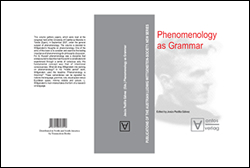
Phenomenology as Grammar . Edited by Jesús Padilla Gálvez. Frankfurt a. M.: Ontos Verlag, 2008. (ISBN 13: 978-3-938793-91-6).
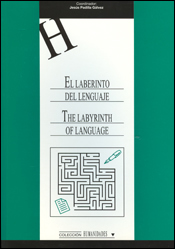
El Laberinto del Lenguaje – The Labyrinth of Language. Jesús Padilla Gálvez. Cuenca: Ediciones de la Universidad de Castilla-La Mancha, 2007 (ISBN: 978-84-8427-510-7).
The International Ludwig Wittgenstein Society e.V., has published the Wittgenstien-Studien (http://www.ilwg.eu/). Most papers are in English and German.
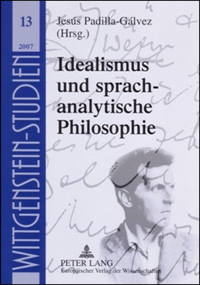
Jesús Padilla Gálvez (Ed.), Idealismus und sprachanalytische Philosophie . Peter Lang, Frankfurt a.M ., 2007. 199 págs. ( ISBN: 36 315 607 53).
Sponsors of the International Wittgenstein Symposium
The following institutions support the International Wittgenstein Symposium in Toledo:
- Facultad de Ciencias Jurídicas y Sociales, Toledo (Spain)
- Universidad de Castilla-La Mancha, Toledo (Spain)
- Junta de Comunidades de Castilla-La Mancha, Toledo (Spain)
- Ministerio de Educación y Ciencia, Madrid (Spain)
- Alexander von Humbold Stiftung, Bonn (Germany)
- Obra Cultural Caja Castilla-La Mancha
- Diputación Provincial de Toledo
Travel and Accommodation
Map of Toledo (Spain)
Travel
- How to get to Toledo by train:
(1) When you arrive in Madrid Airport Barajas, take a metro or taxi to Madrid Atocha (Madrid South railway station). (http://www.renfe.es)
(2) From Madrid Atocha take a train to Toledo, which is situated about 75 kilometres (47 miles) south of Madrid. Trains to Toledo depart almost every hour.
(3) Once you have arrived at the railway station in Toledo, take a taxi to the Faculty of Law and Social Sciences (in San Pedro Mártir), where the conference office is located. The conference office will be open on Thursdy, 15 September from 10.00 am. There you will receive a conference folder.
- How to get to Toledo by bus:
(1) Go to the central bus station in Madrid and take the bus to Toledo There are buses every half an hour, some of them going directly to Toledo. Please contact the following e-mail address for more information(estacionbus@ayto-toledo.org).
Accommodation
- Oficina de Turismo Toledo
Plaza del Ayuntamiento, nº 1
45002 Toledo, Toledo
Email: turitoledo@line-pro.es
Tel: + 34 925 254 030
Fax: + 34 925 254 030 - Oficina de Turismo Toledo
Puerta de Bisagra, s/n
45003 Toledo, Toledo
Tel: + 34 925 220 843
Fax: + 34 925 252 648
Eating and Drinking
Although vegetarianism is less popular in Spain than in the UK or in the USA, most of the restaurants offer salad. If the menu has no special vegetarian section, consult the starters section. The Primer plato (starters) section should contain salads; the Segundo plato (main dish) usually contains fish or meat and the postre (dessert) usually include ice cream, fruit or cheese.
In Castilla (Spain), the most popular drinks are wine and beer. There is also an ample choice of non-alcoholic beverages.
It is customary to give a tip of 5 to 10 percent of the bill, provided that you are satisfied with service, food and drink.
Money
In a city like Toledo, most people prefer cash to credit cards. So please be prepared to pay your bills in cash, using Euro. There are many banks in Toledo, where you can change money (from Monday to Friday), if necessary. Additionally, all of these banks operate Cash points that accept most of the internationally recognized credit cards.
Weather
September is normally hot and dry, but there may be rain showers, and late evenings and early mornings are chilly.
Links
- Renfe (Online timetable of the Spanish Railways http://www.renfe.es)
- Madrid-Barajas (Madrid International Airport)
- Toledo (turitoledo@line-pro.es)
- Universidad de Castilla-La Mancha (http://www.uclm.es)
The Faculty of Law and Social Sciences
Host City
Toledo is a city and municipality located in central Spain, 70 km south of Madrid. It was declared a World Heritage Site by UNESCO in 1986 for its extensive cultural and monumental heritage as one of the former capitals of the Spanish Empire and place of coexistence of Christian, Jewish and Moorish cultures. Roman armies invaded Hispania in 218 BC and used it as a training ground for officers and as a proving ground for tactics during campaigns against the Carthaginians, the Iberians, the Lusitanians, the Gallaecians and other Celts. It was not until 19 BC that the Roman emperor Augustus (r. 27 BC-AD 14) was able to complete the conquest. Until then, much of Hispania remained autonomous. In 484 the Visigoths established Toledo as the capital of their monarchy. The Visigoths were one of two main branches of the Goths, an East Germanic tribe, the Ostrogoths being the other. The kingdom survived until 711, when King Roderic was killed while opposing an invasion from the south by the Umayyad Muslims in the Battle of Guadalete on July 19. This marked the beginning of the Muslim conquest of Hispania in which most of peninsula came under Islamic rule by 718.
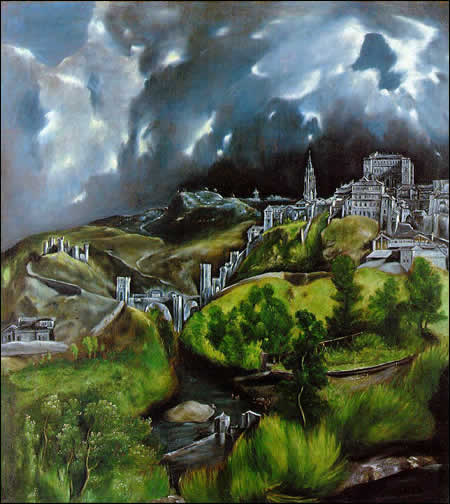
On May 25, 1085 Alfonso VI of Castile took Toledo and established direct personal control over the Moorish city from which he had been exacting tribute, and ending the mediaeval Taifa’s Kingdom of Toledo . This was the first concrete step taken by the combined kingdom of Leon-Castile in the Reconquista by Christian forces. In the 13th century, Toledo was a major cultural center under the guidance of Alfonso X, called » El Sabio » («the Wise») for his love of learning. The program of translations, begun under Archbishop Raymond of Toledo , continued to bring vast stores of knowledge to Europe by rendering great academic and philosophical works in Arabic into Latin. When Philip II moved the royal court from Toledo to Madrid in 1561, the old city went into a slow decline from which it never recovered.
Poster

